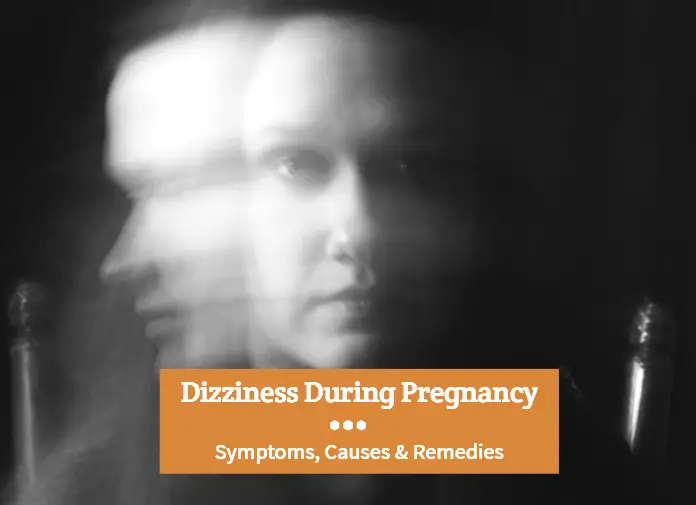Pregnant life is reeling around, and so is the room when you have dizziness during pregnancy. Do you frequently reach out for chairs and support feeling that you’re about to faint? Take note that dizziness, unlike morning sickness, isn’t a typical symptom of pregnancy.
Vertigo is a sign that you’re not getting enough energy or rest. Yes, you can experience light-headedness without having any complications, but it’s not normal if you’ve it all the time.

The reason for dizzy feeling while pregnant is a change in blood pressure. Hormones have a role to play in altering the blood circulation, and they are guilty too. As more blood pools to your baby, oxygen reaching brain reduces making you feel weary.
Why do you have dizzy spells when pregnant? How can you prevent light-headed feeling in pregnancy? Following sections have all your answers.
Is dizziness a pregnancy symptom?
No. There is no necessity that a pregnant woman will feel dizzy at any stage in her pregnancy. Either way, if she does feel dizzy, there’s the least chance of any consequences for the baby.
One can consider it as a secondary symptom which occurs as a result of morning sickness or dehydration during pregnancy. Dropping sugar levels after vomiting in the morning can even lead to hospitalisation.
Causes of Dizziness During Pregnancy
The reason for feeling dizzy without being tipsy is the effect progesterone has on the brain. That’s not in your control. However, low sugar, blood pressure changes, dehydration and maternal heating are controllable.
1. Hypoglycaemia
Only blood glucose can reach brain crossing the blood-brain barrier. When your blood does not have sufficient glucose, brain starves. You can consider it similar to hallucinating after starving during work hours or fasting. Dizziness will go after you eat something. Preferably drink something loaded with natural sugars like fresh orange.
2. Dehydration
The other thing your brain needs is water after having its meal. In the state of dehydration, your brain turns off and makes you feel sleepy. The reason is the same that lack of water doesn’t allow the exchange of materials between blood and brain. As crucial as sugar supply to the brain is the removal of toxins.
3. Elevated body temperature
Recall the last time you were feverish, and you couldn’t understand where you were. It’s all about the optimal conditions brain needs for functioning normally. All these conditions where things change from the normal course cause the brain to lose control.
4. Low blood pressure
Flow to the brain is against gravity. No, wait. Don’t imagine it like blood trying to rise up a hill?. That means that if your blood pressure isn’t in normal range the ratio of blood reaching the feet will be more. During pregnancy blood vessels relax and that reduces the curve with which blood flows. Lesser blood reaching the brain means less oxygen, nutrients and more toxins.
5. Getting up suddenly
Temporarily you black out when you get up from sleeping without sitting for a while. You are used to snoozing and then rushing at the last moment. When you wake up suddenly your body doesn’t settle the fluids. Especially when your baby bump grows, there is a shift in the centre of gravity and it changes your dynamics. Also, make sure you sleep on a soft cushion supporting your belly. Waking up dizzy in pregnancy is because of the wrong sleeping posture.
6. Overworking
Do we need even to discuss this one? When you’re tired, you feel dizzy, groggy, muzzy, woozy, fuzzy, hazy and dopey. Your body is a machine that needs love and rest in vast amounts. Overwhelming desire to clean up redecorate your room or take up any new workout routine will come and go, but pregnancy will go on for longer.
7. Preeclampsia
Just like low blood pressure can make you feel dizzy so can high blood pressure. That’s why the cause of dizziness is any fluctuation in BP. When the blood pressure soars to extreme values during pregnancy, the condition is Preeclampsia. Your doctor will assess you for it in the second trimester even if you’re not showing signs. The soaring blood pressure will daze your brain and blank it out.
When does dizziness start during pregnancy?
The first trimester has either morning sickness or feeling dizzy. Most women experience the symptoms when they’re in the last phase of first trimester or beginning of the second trimester.
Ways to deal with dizziness while pregnant
There’s not much to do for prevention of pregnancy dizziness. All you need is rest, hydration and nourishment. If your health conditions are under check, then there are fewer chances of having persistent dizzy spells. Feeling a little lightheaded is not a big thing and can happen to anyone inviting no further problems.
1. Take enough iron
Anemia is a cause of dizziness because of poor oxygen supply in the body. When your cells don’t get enough oxygen, the entire body feels lethargic. Fainting and tripping over can be the most traumatic thing for pregnant you. Having a constant feeling of lack of energy indicates iron deficiency.
2. Drink lots of water
Staying hydrated is challenging but a rewarding step for many disorders. Warm water early morning keeps you going throughout. When there’s enough water, your body doesn’t go in the state of physical stress. It is challenging to drink excess water, and that’s not what you’ve to do. Drinking water and making the loo your living room isn’t what staying hydrated means. You need to cut down on junk such as fried and extra sweet items. These consume a big fraction of the water you drink. Instead, switch to salads and juicy fruits.
3. Avoid strenuous workout and cut stress
Mental stress can lead to migraines and intense headache. Spend time off feet and allow your body to divert the resources to baby’s development. Both of you need extra care at this stage. Gaining a few pounds won’t be permanent. Once you have your baby, all of it will naturally go away.
4. Eat small regular meals
When you go for the starve feed cycle, your brain also learns the pattern. Eating small meals at intervals allows the body to have a constant supply of energy. Your brain doesn’t need to linger around waiting for food.
5. Dress comfortably
Loose clothing and compression socks will help maintain blood pressure. Extra pressure on any point in the body impairs circulation. Even if you’re wearing any pregnancy belt or support, keep it loose. Use your hands to support your bump.
6. Lie on sides and get up slowly
Lying on left side sends more blood to the fetus. Sleeping on your back will also have the same effects such as wearing tight clothing. Support your belly with your hands.
When should you see a doctor for dizziness in pregnancy?
If the conditions get severe such as fainting or blackouts, then you must tell your doctor. Always have someone along when you are going out for running while pregnant. You can call the doctor if you see a combination of symptoms of preeclampsia, anemia and hypertension.









